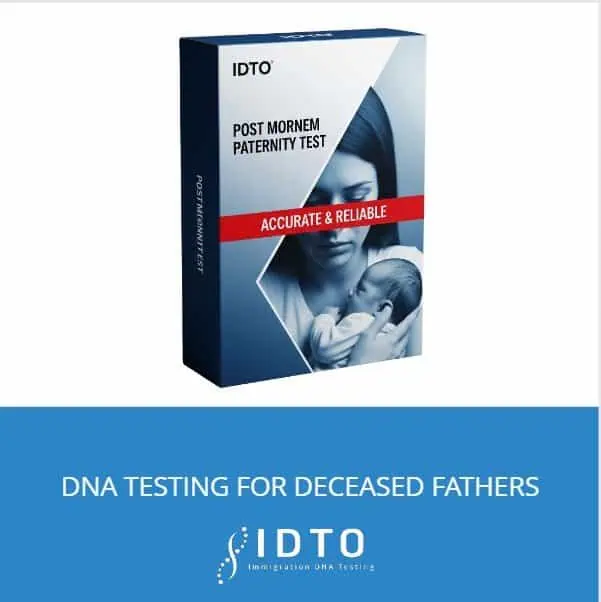
What is deceased father paternity testing?
DNA testing for deceased father is also known as a post mortem DNA test. This testing option helps to determine the biological relationship between a deceased alleged father and child.
Common reason DNA testing for a deceased father is performed are:
1. Adding a father’s name to a child’s birth certificate.
2. Acquiring social security benefits for child under the age of 18.
3. Personal peace of mind
4. Inheritance/Estate Disputes
All DNA samples will be tested and analyzed by our partner The Association for the Advancement of Blood and Biotherapies (AABB) accredited DNA lab. The accreditation ensures your results will be accepted by family court and state agencies nationwide.
How can I establish paternity if the father is deceased?
Establishing paternity when a father is deceased will depend on the deceased biological father’s sample availability and how you plan to use your DNA results.
Legal DNA Testing (DNA Sample Storage):
When establishing the paternity of the child, the establishment of a proper chain of custody is required when a father is deceased. The alleged father’s DNA sample can be used if the sample is the possession of the coroner’s office or funeral. In some cases, a hospital may have a blood sample on file.
We recommend contacting one the facilities mention to inquire about the sample availability.
What type of DNA samples can be used for a deceased person?
The DNA samples recommended to perform a paternity test is as follows:
- Bone:The femur bone is the best sample option extract DNA.
- Teeth:
- Hair Follicle: Hair follicle samples are often collected by funeral homes or mobile DNA sample collector on cases were the father is recently deceased.
- Blood Sample: Blood specimen samples are often collected by hospitals or the coroners office.
- Paraffin Embedded Tissue: Must be sent directly form pathology laboratory
- Post Mortem Tissue: Samples are with the coroners office and funeral homes
The above mentioned samples are samples where a chain of custody can be established and used for legal purposes.
Alternative DNA Sample used to establish paternity:
The following samples listed below can be used for peace of mind purposes.
Toothbrush: We recommend that toothbrush samples be considered when used for a minimum of two months.
Hair Follicle: We recommend placing hair samples into paper envelope and avoid using Ziploc bags.Plastic bags may accumulate moisture which potentially compromise your your hair sample.
Blood Stains: Blood stains on a garment, napkin, band aid or tissue paper
Please keep in mind the efficiency of the lab being able to extract a complete from a forensic sample is dependent upon the storage and quality of your sample. We recommend that you contact our office at 888-204-0583 to learn more about this process.
How much does a deceased DNA paternity test cost?
Pricing for post mortem DNA testing starts at $595.00. Sample collection fees are not included in the cost of your DNA test.
It should be noted, the type of sample being used and will determine the cost. Please contact our office at 888-204-0583 and allow one of our experienced DNA Consultants assist you with your DNA testing needs today.
Where can I go to deceased DNA paternity test done?
IDTO DNA provides post mortem DNA testing services to individuals nationwide. Below are the areas we service. To schedule an appointment with one of our DNA Consultants call 888-204-0583 today.
- Alabama
- Arizona
- Arkansas
- California
- Colorado
- Connecticut
- Delaware
- Florida
- Georgia
- Hawaii
- Idaho
- Illinois
- Indiana
- Iowa
- Kansas
- Kentucky
- Louisiana
- Maine
- Maryland
- Massachusetts
- Michigan
- Minnesota
- Mississippi
- Missouri
- Montana
- Nebraska
- Nevada
- New Hampshire
- New Jersey
- New Mexico
- New York
- North Carolina
- North Dakota
- Ohio
- Oklahoma
- Oregon
- Pennsylvania
- Rhode Island
- South Carolina
- Tennessee
- Texas
- Utah
- Vermont
- Virginia
- Washington
- West Virginia
- Wisconsin
How long does it take to receive my results?
The turnaround time for results will vary depending on the type of sample being tested.
- Tissue and bone samples turnaround times is 5 to 10 business days.
- Swabs, Hair and Bloodstains etc is 2 to 3 business days.
Upon the completion of your results a copy will be mailed to your home and an additional copy will be emailed to you.
Can my results be used for legal purposes?
Yes. Results can be used for legal purposes depending on the type of samples being collected and a proper chain of custody can be established.
Can paternity be established without a deceased parent’s sample?
Yes, It is possible to perform a DNA test without the deceased alleged parent or father. To accomplish this task Performing a family reconstruction DNA test using an available deceased father’s relative. Commonly used relatives are:
- Grandparent/s
- Siblings (Brother or Sister)
- Offspring from the same mother or a different mother
Do I need a court order to perform a post mortem paternity DNA test?
No. A court order is not required for post mortem DNA testing in most cases. Court orders are issued for DNA testing when there is an inheritance dispute or establishing the paternity of a child.
What is required for post mortem DNA testing is consent. The next of kin must give consent for the deceased sample to be collected and tested. For legal paternity testing all forensic samples must be in the possession of the coroner’s office, funeral home or some case the hospital. For questions regarding this process please contact our office at 888-204-0583 to schedule an appointment or to ask a question-.
How long after death can you get DNA?
Acquiring DNA after a person passes away as soon as possible is recommended. We recommend that you communicate with the coroner’s office or funeral as soon as possible and have their staff collect specimen (hair or tissue sample).
In cases where the body has not deteriorated too much. A DNA sample collector collect a cheek swab sample within day after the alleged father passed away.
